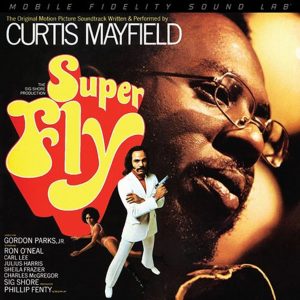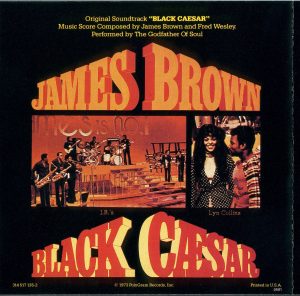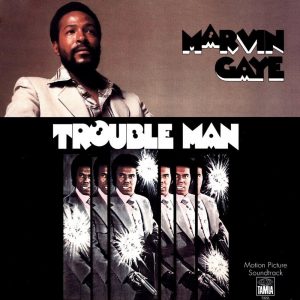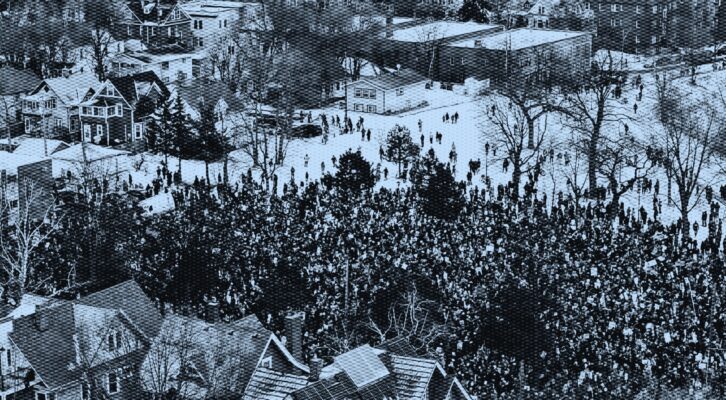You may have heard of the black private dick who’s a sex machine to all the chicks? Shaft? You damn right. From the day that Issac Hayes started collecting his awards for the Shaft soundtrack (two Grammys, a Golden Globe, and an Oscar), the Blaxploitation film soundtrack has been as important a part of the film as the film itself. In many cases, the soundtracks for these films are the lasting impression, as memory of the films they supported fade further and further from the conversation. Blaxploitation films got their name from Hollywood branch NAACP president Junius Griffin in a 1972 New York Times op-ed, who coined the term to decry what he saw as “models of degradation, destruction and dope.” The term, as it’s used now, describes a film movement from roughly 1970-75 that were often gritty crime films, featuring tough cops, bad-ass private eyes, pimps, hustlers, revolutionaries, vigilantes, and nearly everything in between. But at their core, these were movies featuring black protagonists, in primarily black settings, and themes that often spoke to fighting back against corrupt systems and oppression in whatever way you could.
But these weren’t films to be proud of, according to Griffin. What they were were shameless attempts to get black dollars (“Only recently the movie industry discovered that even the nation’s poorest ethnic group, black people, makes the difference between profit and loss,” he wrote) by telling stories that reveled in the worst aspects of black life—the crime, the drug use, the poverty. These stories, Griffin argued, were on their way to becoming the only story told about the community. The move toward what he saw as exploitation was a far cry from what he considered the medium’s power to elevate positive images of Black life. The Blaxploitation era was far from the first glimpse of Black life on film; Black films were appearing as early as 1919 with plots as far ranging as religion, murder mysteries, musicals, and comedies, and in Griffin’s eyes, there was no reason that Black movies couldn’t “contribute to building constructive, healthy images of black people.”
Griffin’s argument was certainly not the only thinking about the issue, though. A 1972 Jet magazine article quotes Super Fly star Ron O’Neal as saying “What is raw about the film and what is upsetting people is its simple truth,” and noted that critiques like Griffin’s had more than a hint of respectability politics attached to them: “it mostly offends the middle class,” O’Neal said. Griffin’s stance of seeing fewer these types of films in theaters seemed to soften when he served as the Executive Producer for 1973’s Detroit 9000, a heist film, with a sizable Black cast, directed by someone (Arthur Marks) who’d directed several Blaxploitation films, that’s heavy on the guns (“it has its share of violence and bloodshed… like all the rest” a 1973 Jet magazine feature explains), and a soul-funk soundtrack with songs penned by Motown songwriting team Holland-Dozier-Holland. What a difference a year makes.
 But even with the negative attention, coming from black actors and filmmakers to civil rights organizations like Operation PUSH and CORE, these films spoke to a new era of films and a new kind of filmgoers, namely the ones who wanted to see stories that centered black actors, directors, and often, Black stories and lives (even if it was true that these were just one version of black life, and not representative of a whole community), and the soundtrack for that had to be as bold as the images on the screen.
But even with the negative attention, coming from black actors and filmmakers to civil rights organizations like Operation PUSH and CORE, these films spoke to a new era of films and a new kind of filmgoers, namely the ones who wanted to see stories that centered black actors, directors, and often, Black stories and lives (even if it was true that these were just one version of black life, and not representative of a whole community), and the soundtrack for that had to be as bold as the images on the screen.
Many of the films were explicit in their connection between the revolutionary Black Power Movement of the time, and the music often played with that idea too. For example, when writing the soundtrack to Super Fly, Curtis Mayfield said, “Many of these songs come from the heart, and they were about the different movements about the challenges of black people and other minorities trying to be equal in this society, and it was important for me to say that.” And despite the many one-dimensional roles for women in these films, as scholar Yvonne D. Sims argues in her book, Women of Blaxploitation, the stars of these films like Pam Grier (Foxy Brown), Jeannie Bell (TNT Jackson), and Tamara Dobson (Cleopatra Jones), “redefined the ways in which women in general were represented in film by portraying a new character that could hold her own among men and women equally.” If you want to underline that point, there was no better choice for the Cleopatra Jones soundtrack than Millie Jackson, someone known for doing and saying exactly what she wanted musically. Despite the criticisms, these were movies that recognized that all people want to see themselves reflected in the media. Shaft director Gordon Parks explained in a 1971 interview with The Crisis magazine that “I think [Shaft] can emerge as a black hero for black kids.”
But let’s go back. Back before the fictional complicated man who was understood by no one but his woman (John Shaft), there was a real man named Melvin Van Peebles. Van Peebles was the writer, director, producer, composer, and star of the 1971 film Sweet Sweetback’s Baadasssss Song, which tells the story of Sweetback, and his journey from his childhood in a brothel to revolutionary on the run. It was, he told Life magazine that year, “the first black movie that doesn’t cop out.” He’s right about one thing; it doesn’t cop out. Its graphic and unwavering eye (the film earned an X rating, which Van Peebles used in its marketing “Rated X by an all-white jury”) may very well have been the catalyst for the Blaxploitation movement.[1] The soundtrack featured music from the then little-known group Earth, Wind, and Fire, interspersed with dialogue from the movie. There are some notable tracks, but unlike some of the ones that came later, the soundtrack for Sweetback feels disconnected as a standalone album. That would change a few months later when the Gordon Parks-directed Shaft starring Richard Roundtree as a tough, sexy private detective hit the screens, and the double album composed and performed by Isaac Hayes hit turntables. Not only did the album function as an amazing film score, it also works all by itself as a piece of 70s funk/soul.

Of course, it’s not like these movies were the first black films that had notable soundtracks. Quincy Jones’ work for In the Heat of the Night (1967), for example, made great use of Ray Charles on the title track and a host of notable jazz and soul musicians (Roland Kirk, Ray Brown, Billy Preston, to name a few) throughout, as did his soundtrack for 1969’s The Lost Man, which would probably be included in more discussions of Blaxploitation soundtracks if it had come out a little later. But these films of the 70s were part of a larger movement. People were rejecting the images that actors like Sidney Poitier, who coincidentally starred in both of those Quincy Jones-soundtracked films, had been giving filmgoers. “Sidney Poitier was a great actor,” actor Fred Williamson (Black Caesar, Hell up in Harlem, and Bucktown, to name a few) told the Los Angeles Times in 2009, “But he did not fulfill the void of how some blacks interpreted their impact on society.”
It’s worth noting, for example, that even though The Lost Man is a heist movie with a black liberation movement backdrop, a New York Times review at the time praised it for its ability to “recognize the existence and root causes of black militancy without making anyone—white or black—feel too guilty or hopeless.” So… yeah. These were new times, and new sounds. Shaft, and its history-making run—Hayes was the first black non-actor winner of an Oscar for the soundtrack—showed that listeners were ready for albums that didn’t just compliment the film, but were just good albums on their own. It also meant that other musicians recognized the impact of the movie score; the listening public, got a lot of albums throughout the height of the Blaxploitation trend. There were albums by Solomon Burke (Cool Breeze); the Gordon’s War soundtrack featuring Barbara Mason and The New Birth; Roy Ayers (Coffy); and Edwin Starr (Hell up in Harlem), to name a few, and a few like Isaac Hayes, J.J. Johnson, and James Brown recorded several. Brown even has a soundtrack-but-not-really in his 1973 album The Payback, which was intended to be the soundtrack for Hell up in Harlem, but according to a story that shows up in several books about Brown’s music, it was ultimately rejected for not being funky enough.
There was a seemingly endless stream of movies and soundtracks, but nothing lasts forever. According to a 1977 Ebony article, in 1973 there were “101 film productions sporting Black stars or themes,” but by 1977, the numbers shrunk significantly, and “[had not] topped ten” that year. Not only was Blaxploitation in decline, but it seemed like any black-lead film, whether it fit the parameters of Blaxploitation or not, stood little chance of being made. There were still a few great soundtracks and songs (or at least interesting ones) in the later days of the genre: Arthur Lee and his band Love gave us the theme song for the 1974 western Thomasine & Bushrod; Brothers (1977) by Taj Mahal; and Youngblood (1978) by War, but the era was waning. The budgets got lower, the plots more formulaic.
But at its height, the Blaxploitation genre gave black actors, writers, and directors a real chance to create films that spoke to Black moviegoers, and along the way, these films also gave Black musicians a vehicle to create music that was lush, cinematic, funky, soulful, sexy. “We can all thank brother Isaac for opening the door,” Jerry Butler told Jet magazine in 1973. And it’s important to remember that these soundtracks weren’t just accompanying movies, they were setting trends and creating new opportunities for Black musicians and composers. These soundtracks were rock, they were jazz, they were soul. They enveloped the breadth of Black music. And they’ve lasted, through years, and changing tastes, and even disconnected from the movies they were created to support. They are the sounds of a time and a place and a movement.
Suggested Listening

Curtis Mayfield, Super Fly (1972): “I think Curtis Mayfield is a teacher through his music,” Stevie Wonder told NME in 1973. “He writes some very heavy lyrics.”
Also recommended: While not a Blaxploitation film, spend some time with Mayfield’s soundtrack for the 1977 film version of the prison stage-drama Short Eyes.

James Brown, Black Caesar (1973): Stevie Wonder was originally tapped to score this film, but bowed out because of the film’s violence. Of his work on the soundtrack, Brown told NME in 1973, “Yes, it’s about the ghetto and crime, but it has an important message. The story material will motivate kids to want to be somebody. The hero wanted to be right but he was forced to be wrong. Even so he was somebody. And that’s a start in the right direction.”
Also recommended: James Brown gets back in the soundtrack game with the Slaughter’s Big Rip-Off soundtrack from 1973.

Marvin Gaye, Trouble Man (1972): In some cases, the loss of connection between the film and the soundtrack means that some films, like Trouble Man, aren’t all that remembered today. Luckily the soundtrack is. Gaye told his biographer David Ritz that this was “probably my favorite work. […] For years afterwards, I wanted to do another score, but no one offered me one.”

Herbie Hancock, The Spook Who Sat by the Door (1973): The film version of Sam Greenlee’s novel about a Black CIA agent, features a jazz-funk score by the great pianist. In his autobiography Hancock writes, “The producers didn’t have much money, but I didn’t care—I really wanted to do the music for this film.”
Also recommended: Fat Albert Rotunda. Hancock composed much of the music from this album as the score for Hey, Hey, Hey It’s Fat Albert, a 1969 special that was the precursor to the later animated series.

Grant Green, The Final Comedown (1972): Another that draws on funk’s jazz roots, this time from prolific guitarist Green. This was the first soundtrack release from jazz label Blue Note.

Bobby Womack and J.J. Johnson, Across 110th Street (1972): “I’d got two successful albums under my belt,” Womack wrote in his autobiography. “And for some reason I wanted to write a film score. […] I had come from a ghetto so it was something I knew about. I knew all its stories.”

Smokey Robinson, Big Time (1977): Robinson not only did the score for the movie, but invested a lot of money into its production. “This movie is my project and that’s why I did the soundtrack. […] I’ve got close to half a million dollars invested in it, although I feel confident that I’ll make it back because it’s a quality movie,” he said. 1977 was definitely late in the game for this kind of movie, so whatever its quality, Robinson lost most of his money.

Jerry Butler, Melinda (1972): The first movie role for former football player Jim Kelly, who’d go on to appear in several more films in the genre.
Also recommended: Definitely not a Blaxploitation film, but check out Butler’s contributions to the soundtrack for the Joe (1970), which also features music from Bahamian soul/folk/Caribbean musician Exuma—both would fit nicely if you were making a playlist based on Blaxploitation soundtracks.

Aretha Franklin, Sparkle (1976): This film is much more a Black-centered movie than a Blaxploitation movie, strictly speaking, but it often gets included in the discussions. For the purposes of my discussion, which is soundtracks, let’s just go ahead and include it. “Even though I had a touch of the flu, the album still turned out good,” Franklin told Jet magazine. Franklin teamed with songwriter/producer Curtis Mayfield for the album.

The Impressions, Three the Hard Way (1974): “Nobody will have to see the movie to enjoy this fine set,” Billboard wrote of the soundtrack, which features a soundtrack by The Impressions, best known for being the group that launched the careers of Curtis Mayfield and Jerry Butler (although the lineup had changed significantly by this time).
[1] Some name Cotton Comes to Harlem (1970), directed by Ossie Davis and based on the Chester Himes novel of the same name, as the first blaxploitation film. And that may be true, but the soundtrack by Galt MacDermott (of Hair fame) isn’t one of my favorites, and comparing it to the Donnie Hathaway-penned soundtrack for Come Back, Charleston Blue, the sequel released in 1972, you can hear a real difference in how these soundtracks were put together in the genre’s later years. Rather than feeling part of an exciting new musical trend, it sounds dated, and doesn’t really feel like a Blaxploitation soundtrack to me despite the movie’s claim to fame as the first.

















